- Home
- Martin Cruz Smith
Nightwing Page 2
Nightwing Read online
Page 2
“No.”
“You will.” Abner went on chuckling.
The old man had acted strange before. Never as bad as this. Even if he grabbed Abner and took him into the mesa, though, who would dare help? Who wouldn’t run?
“The other priests know about your plans?”
“I asked them over. Some of them, they’re busy making up tourist junk. Some of them, they wanta watch game shows on TV. I’ll do it without them.”
Abner unstoppered another bottle of black sand. He swayed delicately as he stepped around his painting, but he was steady enough when he bent over to draw a final figure within the ring of red. Painstakingly, he let the oily sand shape itself into a man without a head. A ragged cape hung from his shoulders; from the cape extended fingers. Abner opened a leather pouch and took out small bones, which he placed as a necklace. Where eyes and a mouth would have been, he put round corn cob sections. Under the eyes, trails of broken mirror glass, so that the headless figure seemed to be staring and crying at the same time.
“Almost done.” Abner stood up, satisfied.
He wiped his hands on a rag and rummaged in his trunk until he came up with a buck knife and a leather belt. Putting a foot on one end of the belt, he snapped it taut along his leg as a strap and slapped the knife blade back and forth across it.
“If you’re going to end the world, one more day won’t make a difference,” Youngman said. “Wait until tomorrow.”
“Radio said maybe rain tomorrow night.”
“So?” Youngman almost laughed.
“New clouds coming, Flea,” Abner said seriously. “Dreamed them up. My clouds don’t like rain.”
Abner felt the edge of his knife. Then he crossed to the rabbit cage, lifted the animal out and strung it by its rear legs with a leather thong from the top of the shed door. The rabbit jerked from side to side and rolled its eyes.
“What do your clouds like?” Youngman asked.
Abner grabbed the rabbit by the base of the ears and twisted its head back, stretching the neck. He laid the knife across the white fur of the neck, and then his arm dropped.
The old man stared hesitantly, standing awkwardly in the frame of light, one hand still gripping the squirming rabbit. Reflection made the blade luminous. Youngman felt the stare like a blind hand running over his face, as if recognition had suddenly been lost.
“What do they like?” he repeated.
The rabbit clawed the air. The knife blinked, turning in Abner’s hand.
The old man was crazy, Youngman thought. Senile. Finally over the edge after a lifetime of datura, grass, peyote, and bad booze. Tripped on stories, prophecies, lies, and frustration. Not that Youngman especially loved Abner, he told himself, any more than a man could love a gnarled ironwood tree or a stone chimney. When the tree fell or the chimney split, though, there had to be a sense of loss. As if a touchstone had been taken away. But a medicine man plotting war in a junkyard shed against the offices of the Indian Bureau, against the power shovels and million-dollar bankrolls of the mining companies? That was not only pathetic, it was downright comic. Abner still thought the Hopis were the Chosen People. They weren’t chosen, they were marked for erasure.
Abner’s eyes said he wanted to answer and that he couldn’t.
“You won’t believe me, Flea,” he finally said.
“Then why did you start raving about all this?”
“Because you’re my friend. You’re part of it and you have to help. Don’t worry,” Abner became more reassuring, “we’ll kill them all.”
“Just tell me what to do.”
“Later, when I’m dead.”
The wind that penetrated the shed grew an edge. Youngman thought about reopening the wine.
“If you can wait that long, Abner, I guess I can.”
As Youngman stood, the glossy coils of the serpentine seemed to shift. An illusion in the shadow. For Abner, though, from the altitude of datura, Youngman guessed the spirals were moving and gaining speed. He was still nagged by the suspicion that Abner might take a gun and start sniping at cars on the highway.
“But if you’re ending the world different this time,” Youngman added, “I’d be curious how.”
“Different.”
“No floods, fire, ice, bombs. Guns, then? How?”
“This time, Masaw will end it,” Abner said. “I’ll see him tonight.”
“Tonight, you’re going to see him? The god of death, huh?”
Abner’s concentration slipped to his painting and the unfinished figure with crying eyes and round mouth and no head inside a ring of red sand. The black body and cape shone, soft as fur.
“If I do things right,” he said.
Youngman lifted his hat and ran a hand through his hair. He felt helpless.
“Okay,” he gave up. Leaving the shed, he stopped in the doorway next to Abner and the hanging rabbit, half in shadow, half in light. “If anyone can do it, you can.”
On the way to his jeep, he heard the rabbit’s whimper cut short.
He had been born into the Coyote Clan, the only son of an unemployed construction worker and a perpetually angry woman. Joe Duran, bear-sized, arms like posts, never brooded over lack of work. Once for a year he hauled bricks at White Sands for the Air Force, an experience he felt bestowed on him enough of labor’s honors. What Joe Duran did best was drink and hunt. He could go up the Dinnebito Wash with five rounds and stagger home with four kills. “Saved the last round for myself,” he’d tell Youngman. The third thing he did best was clown. Whenever clowns were needed for a ceremonial, Joe Duran was always the first tapped. Disguised in white powder, he would stumble drunkenly through a line of priests, or run after women spectators waving a wooden penis, or walk suicidally backwards along the edge of the mesa. Which struck everyone as terribly funny, although it was no different from the way Joe Duran acted any other day, and in time, of course, he drove his angry wife crazy. Youngman remembered watching his father wearing clothes backwards and standing on his immense hands on the highest point of the mesa, laughing while Youngman’s mother pitched knives and rocks. Finally, as a last grasp for sanity, she took up with a Navajo in Window Rock. Joe Duran followed them, killed them with his deer rifle, kicked the dead Navajo out of bed, lay down beside his wife and blew his own brains out. It was a common melodrama of reservation life.
Youngman was trucked off to mission school. Life there was comfortable enough. He had food, friends, a bed. In class, he stayed as mute as he could, watching. The teachers listed him as “slow, possibly retarded.” Until the age of fourteen, when several sets of oil paints were donated to the school.
He had a glib facility, a hunter’s eye for color. He didn’t speak much more than he had before, but he would sit in front of an easel every waking minute, painting landscapes, nothing but landscapes. They were shown and, to his surprise, they were bought. Youngman experimented with watercolors, tempera, and acrylic, obsessed not so much with art as with the revelation that he could make money. In one step he strode past every other Indian he knew, and past his father in particular. Within two years, he developed a technique with acrylic and varnish that gave his desert landscapes a hard, jewellike finish that was totally cynical and artificial. Youngman, alone, knew what he was doing. Not painting the desert. Killing it. On his canvas, birds were as bright and dead as souvenir pins, and falling rain had the quality of rocks. It was a style only whites could appreciate, but they were paying. At the galleries in Santa Fe and Phoenix, they paid a lot.
Flattered by whites, he responded in kind. He cut his hair and dressed in sports jackets. Found himself becoming a good-looking man though not pretty, his features were too angular for that. Only occasionally was he betrayed by a dark hostility in his eyes, his mother’s gift.
The University of New Mexico offered Youngman a full art scholarship. This was the second step up, Youngman told himself. He could be anything.
The summer before his first year at the university, Youngman retur
ned to the reservation. The Snake Dance was being held at Shongopovi. For fun, Youngman joined the runners whose race across the desert signaled the start of the ceremony. For the first time in seven years, he wore a leather kilt and moccasins. He had always had stamina. Midway through the race, his moccasins were soaked through with blood. The pain encouraged him. He overtook the local boys at the base of the canyon and sprinted up the narrow trail to win. The Snake Clan was about to award Youngman the prize when they were stopped by a priest of the Fire Clan.
“This boy is not Hopi. Give the prize to a Hopi. Otherwise, all my clan will leave.” The priest was Abner.
“I am Hopi and I won,” Youngman protested.
“You are empty. I see inside you and nothing is there. This prize is only for real people.”
Humiliated, Youngman returned to Albuquerque, to college. But college was not what he’d expected. In most subjects he was stupefyingly ignorant even for an Indian. Of history, literature, science, or social studies, he knew next to nothing. Worse, he came to the fast dead end of his talent. As long as he painted the desert, however fraudulently, the images came easily. Faced with anything else, even an elementary life class, he revealed himself as a complete incompetent. It was as if he knew a single song with a single variation and otherwise was dumb. But there were a number of ways to take out his frustration. The university had other Indians, mostly Navajos who regarded a Hopi as inferior. Youngman picked fights with Navajo gangs, with white football players, with just about anybody. After a single year of failing grades, he was drafted. After one year in the Army, he was court-martialed and put in the stockade at Leavenworth, where he served the next six years of his life.
At the age of twenty-seven, Youngman was released and went to Los Angeles. He joined the Mexicans working as Indian extras in films, mixed colors for paint stores, and delivered cars for Hertz. One morning, delivering a rented Continental to Burbank, he was driving through the canyons that segment L.A. into an archipelago of concrete islands. Pulling off the freeway, he left the car to walk into the canyon, which had the color and texture of crumpled brown paper. Sitting still, he watched the shadows slide like cats over the hills. Day cats that leisurely stretched and curled on the warm earth. And still he sat. Towards sunset, thousands of fire-control sprinklers fanned the parched walls of the canyon with water bought and diverted from the rivers of Arizona. Round as marbles, the water rolled through the air and shattered in the last rays of the sun. One drop after another, million after million, exploding unheard against the moans of the freeway. Water that fell as rain in the Rockies, that flowed as the Colorado River through the Grand Canyon, heading for the desert but rerouted to a sprinkler system. He laughed until he nearly cried.
Youngman delivered the car ten hours late, was fired and, the following morning, returned to the reservation, not much better off than when he’d left.
His first year back he spent relearning how to live. He taught himself again his own first language, which dry holes would yield water to a digging stick, how to mend clothes with a bone needle and to tell the difference between the tracks of a running deer and an unwary one.
At the end of the year, a pickup truck of old men pulled into his camp.
“You’re still here,” they said. “We expected you to be gone long ago.”
“I’m still here.”
“Are you going to stay?”
“Yes.”
“Then we will have to do something about you. You’re a troubled person. Never at rest. We can’t tell you to leave because we know our obligations. So we are going to put you to work. From now on you’re a deputy. You go up to Hotevilla tomorrow and sign up. Maybe, someday, we can get some good out of you.”
The old chiefs back into their pickup and left.
That was two years ago. Being deputy consisted largely of disarming drunks and making sure no tourists brought cameras into the pueblos when dances were held, Youngman had all the time he wanted to escape into the wilderness. He stayed out of trouble because he had the obligation to uphold the law. The old chiefs weren’t so dumb.
Youngman downshifted and climbed the jeep through a copse of junipers onto a dirt road. The Momoa ranch was in the hills above Dinnebito Wash. As the road wound its way up, the temperature dropped. Scrub gave way to more junipers, oaks, and piñon trees. In the hills was water, and water was wealth.
“You finally come,” Joseph Momoa welcomed the deputy. “Where the hell you been?”
Joe Momoa and his family had five thousand acres of timber and grassland that included two springs and pasturage for five hundred cattle and seven hundred sheep. His house was paneled in redwood and sat under a television aerial as large as a radar dish. The barn had been converted into a six-car garage and game room. Joe himself had been converted into a prosperous Mormon, along with his wife and his sons Joe Jr. and Ben. The Momoa men were alike in their aggressive bulk, flannel shirts, and flashy Acme boots. Joe drove an air-conditioned pickup. His sons hot-dogged it on candy-colored motorcycles. Among Hopis, they were Rockefellers.
“What have you got to show me?” Youngman asked.
“You’ll see.”
Joe led the way on a sloping path under piñon branches. Bastard doesn’t even walk like an Indian any more, Youngman thought with a sense of irony. For more years than he cared to dwell on, he hadn’t walked like an Indian himself.
“Piñon nuts oughtta bring in $10,000 this year,” Joe said automatically.
“How much in pines?”
Joe shot a scowl over his shoulder. Pines grew above the Momoa spread and every year hundreds of the trees were trucked out secretly and illegally.
“That’s your problem,” Joe Jr. said, one step behind Youngman.
They descended to a meadow of corrals and pens. Youngman could see sheep milling in their area. Cattle were lined up at their trough. The dogs on guard cowered at the sight of the Momoas.
“Now, you take a look at that.” Joe pointed to the middle corral.
At first, Youngman thought the corral was empty, but as he came through the gate he saw three quarterhorses lying on their sides. Their eyes were open and rolling. One struggled to its knees and Youngman could see that what first appeared to be a dark blanket over its back was caked blood and flies.
“Get a horse blanket,” he ordered Ben Momoa.
“Pa?” Ben took a step back.
“Do what he says.” Joe took a blanket from the top rail of the corral and threw it to his son.
The kneeling horse lolled its head in the manner of an animal drugged by locoweed. Flies heavy with blood bounced into the air as Ben waved the blanket at them. Youngman brushed the flies away from his face.
“What the hell happened?” he asked.
“You tell us,” Joe said.
The withers and haunches of the horse looked as if they had been shredded by a straight razor wielded by a madman. Youngman patted the horse’s head, ran his hand down the mane and stopped short. From neck to tail the horse’s back was pink flesh, dry blood and hanging strips of skin. The cuts weren’t deep.
“Keep waving that,” Youngman told Ben.
“I’m gettin’ sick.”
Not deep, more like gouges from a V-shaped leather punch. And there were more than Youngman could count. Some blood had dried in streaks down the horse’s legs and belly, but the horse had lost a lot more blood than that. The animal was groggy, but not in apparent pain. Youngman checked the tail. It was brown with dried blood; it should have been totally matted.
“Well?” Joe demanded.
Youngman looked at the horse’s hooves. They were smooth, not the way they’d be if the horse had struck out at anything. Youngman walked over to the other horses. They were in worse shape. The flies on them formed moving, buzzing hunchbacks. He examined their hooves, too. They were as smooth as marble, but the horses were dying from loss of blood. Three horses, half their skin flayed off, that didn’t fight back.
“I don’t know,” Youngm
an said.
He took a deep breath, stepping away from the mutilated horses. They didn’t even try to swat at the flies. Youngman scanned the ground.
“Ever let your dogs in here?”
“With horses? Never.”
Youngman could see nothing but hoof marks in the dirt. No deep ones, nothing suggesting excitement, nothing suggesting that anything but horses had been in the corral.
“Found the horses like this this morning?”
“Right.”
Youngman looked up at the clear blue sky. Eagles? Ridiculous. As his eyes dropped, he noticed something he should have seen before. Where blood stained the ground were wider, blacker stains. He picked up some of it between his fingers. It was sticky and smelled of ammonia.
“Jesus.” He wiped his fingers on clean dirt. “Well, I can’t figure it. Any of it.”
“Coyotes,” Joe said firmly.
“Coyotes? Your sheep, maybe. Or a calf. Not horses, no way. You’d’ve heard your dogs. The whole corral’d be torn up. There’d be tracks. No coyote bites like that.”
“Then a cat,” Joe insisted.
“No.”
“Then what?”
“I told you I don’t know.”
“There’s nothing left, damn it. I lost three horses, I’m going to have to shoot ’em. This is $600 in quarterhorse ripped up here an’ I want some action. I want you to start up a hunt an’ I don’t mean some half-assed trackin’. A real hunt. The Navajos have a helicopter. You get it an’ we’ll go over these hills an’ shoot every coyote an’ cat we see.”
“You’re not going to get the animal that attacked your horses that way,” Youngman answered.
“I say I will, an’ even if I don’t we’ll clean up these hills the way they should of been a long time ago.”
“Look, I know how you feel about losing some horses.”
“The hell you do, Duran. You don’t have a horse to your name. Now you get on the stick an’ fix up a helicopter for my boys an’ me. We got the rifles. Lots of em.
Youngman could see it. A helicopter over Dinnebito Wash, with the Momoa boys blasting away like machine gunners at anything that moved. Wouldn’t they have a good time.

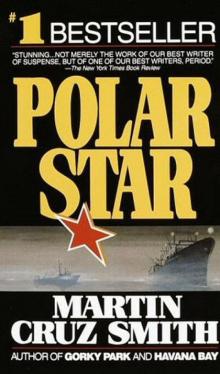 Polar Star
Polar Star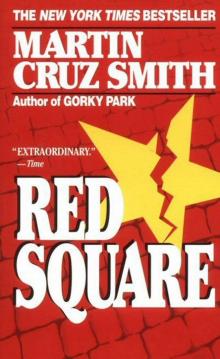 Red Square
Red Square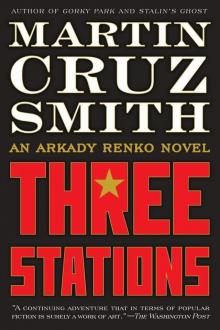 Three Stations
Three Stations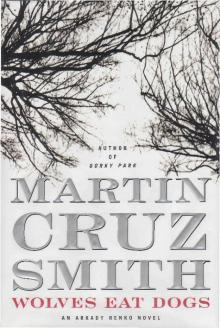 Wolves Eat Dogs
Wolves Eat Dogs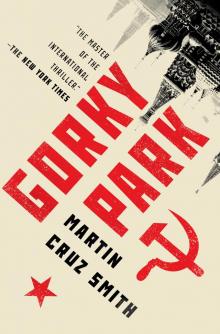 Gorky Park
Gorky Park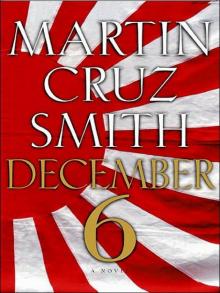 December 6
December 6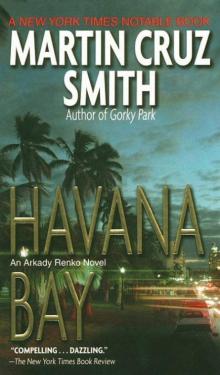 Havana Bay
Havana Bay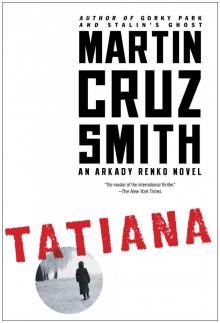 Tatiana
Tatiana The Girl From Venice
The Girl From Venice Stalin's Ghost
Stalin's Ghost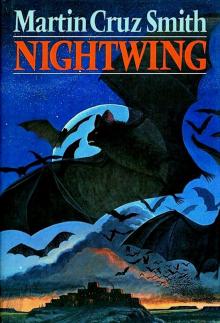 Nightwing
Nightwing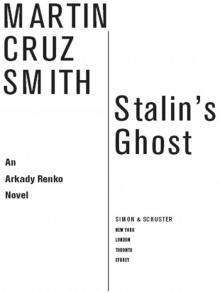 Stalin s Ghost
Stalin s Ghost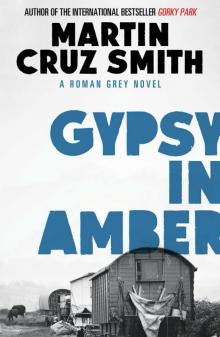 Gypsy in Amber
Gypsy in Amber Rose
Rose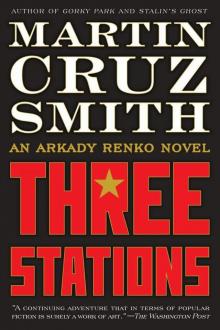 Three Stations: An Arkady Renko Novel
Three Stations: An Arkady Renko Novel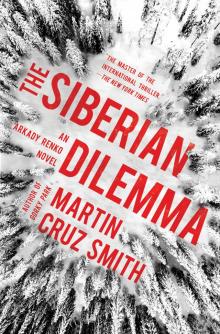 The Siberian Dilemma
The Siberian Dilemma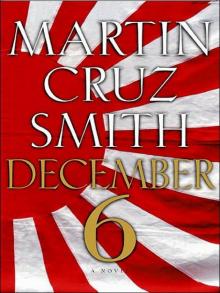 December 6 (V5.0)
December 6 (V5.0)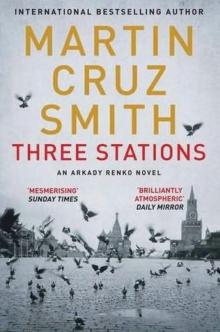 Three Stations ar-7
Three Stations ar-7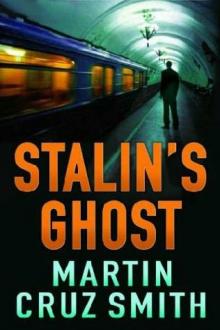 Stalin’s Ghost ar-6
Stalin’s Ghost ar-6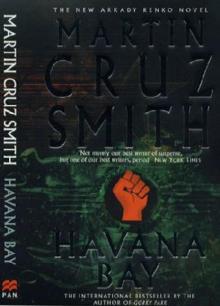 Havana Bay ar-4
Havana Bay ar-4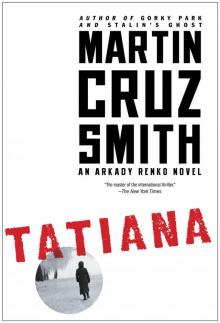 Tatiana ar-8
Tatiana ar-8